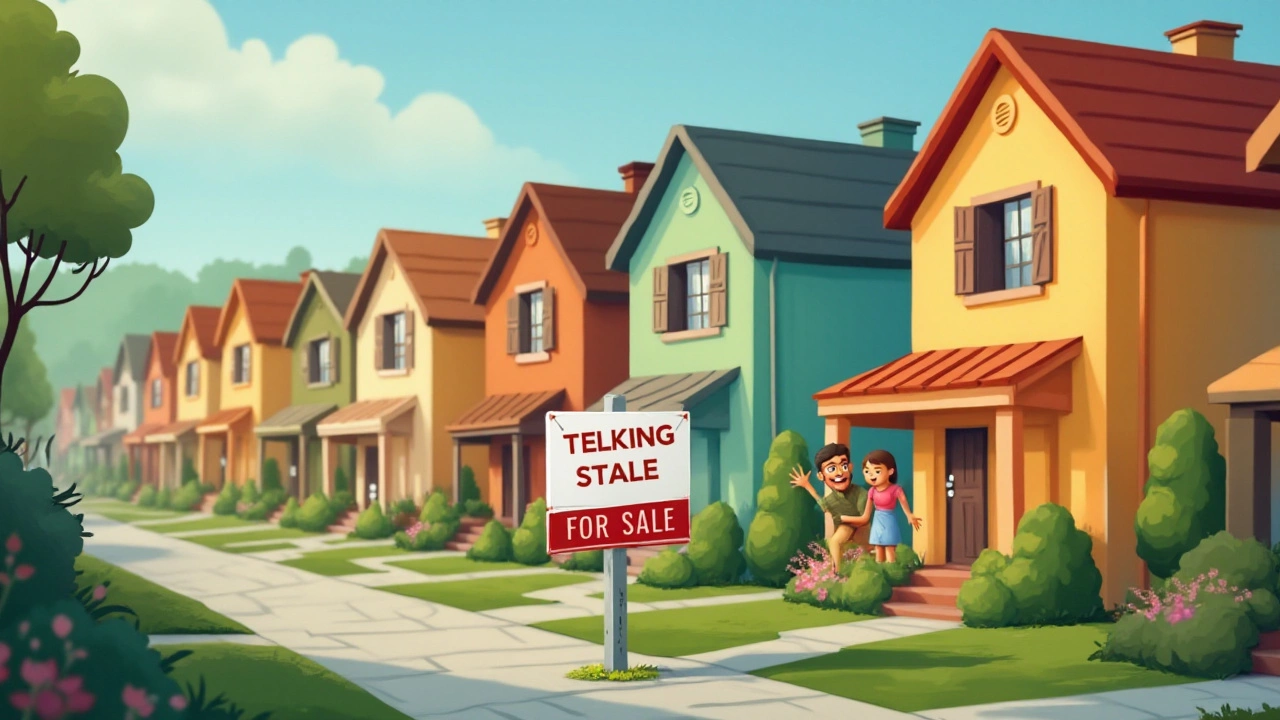Owning a home is a dream many cherish, yet it comes with the binding obligation of making those monthly mortgage payments. But have you ever wondered how long you could actually reside in your home if you stopped paying the mortgage? Most people don't, but it's worth knowing.
Before you think of dodging those payments, it's crucial to understand the mortgage terms that come with buying your home. These terms outline the specifics, like when payments are due and what happens if those payments are late.
Interestingly, lenders often offer a grace period, a short span during which you can make your payments without late fees. But what if that period has passed, and the payments are still not forthcoming? The consequences can be severe, ranging from a string of late fees to the ultimate risk of foreclosure.
One must also remember that communication with the lender can often be a lifesaver. Building a transparent relationship with your lender can open doors to several alternatives that might prevent the loss of your home.
As the journey to homeownership entails several intricate steps, it’s vital to have a clear understanding of the responsibilities involved. So, delve into this article to grasp important insights on staying ahead of mortgage payments and keeping the roof over your head firmly intact.
- Understanding Mortgage Terms
- Grace Periods and Their Importance
- Consequences of Missing Payments
- Tips for Communication with Lenders
- Avoiding Foreclosure
Understanding Mortgage Terms
The journey of homeownership certainly isn't devoid of paperwork, something every potential buyer is keenly aware the moment the mortgage process rears its head. One must familiarize themselves with the terminology and nuances of their mortgage agreement to ensure a grasp on how to manage it effectively. Typically, the mortgage agreement is extensive and covers various aspects such as interest rates, the term of the loan, payment schedules, and tons of stipulations that you may not think about when excitedly signing the papers to your new abode.
Interest rates, for instance, can either be fixed, meaning they remain the same throughout the life of the loan, or variable, adjusting at pre-set periods. Understanding which kind you have can save you from financial surprises down the road. Then there's the mortgage term, which dictates the length of time you have to repay the loan—usually spanning 15 to 30 years. The decision to choose a lengthier timeline might afford lower monthly payments, but bears the cost of larger interest over the term of the loan.
A survey posted by the National Association of Realtors underscores that nearly 78% of first-time homebuyers admit to not fully understanding their mortgage terms, leading them to potentially costly misunderstandings. This statistic emphasizes the importance of truly grasping the full scope of your mortgage obligations.
Let’s not overlook payment schedules, which detail precisely when your payments are due each month. Making consistent, on-time payments is vital, as it affects your standing with the lender and your credit score. Often the agreement will specify what is considered "on-time," with some giving a buffer or grace period, typically up to 15 days, after the due date. Missing one or even a few can escalate to late fees, increasing your outstanding balance faster than you might imagine.
Hidden within the fine print, you'll likely encounter a myriad of other clauses detailing what might happen if you default. Clauses on escrow accounts, property taxes, insurance requirements, and penalties for late payment are crucial to be aware of. Ignorance of these terms can lead to unexpected financial burdens. If ever in doubt, consulting with a mortgage broker or financial advisor could provide the clarity needed, ensuring you're not going to be left high and dry when it comes to your home mortgage terms.
If you want to understand your mortgage terms completely, "a comprehensive discussion with your lender or a legal expert is invaluable," notes Jane Bryant Quinn, a well-respected financial journalist known for her insightful advice on mortgages and loans.
By getting to grips with these terms early on, you not only stand a better chance of navigating the complex world of home loans but also protect yourself from future hardships. The time invested in understanding these documents is time well spent, providing peace of mind and a clearer path forward on your homeownership journey.
Grace Periods and Their Importance
When it comes to mortgage payments, knowing about grace periods can be a key advantage for homeowners. A grace period is essentially the extra time given beyond the due date to make your payment without incurring any late fees. Most mortgages come with this feature, typically offering 15 days, though this can vary depending on your lender and the specific terms of your loan. It is crucial for homeowners to familiarize themselves with these terms, as they can provide some breathing room in financial tight spots.
During the grace period, while late fees may not apply, it's important to note that the payment is still technically late from the lender's perspective. This means if payments are repeatedly made during the grace period, it may reflect poorly on your payment history. Ensuring that payments are made within this timeframe can help maintain a healthy credit score. Lenders may view consistent payments within the grace period as a lack of urgency or financial instability, which could affect future credit opportunities.
The concept of a grace period isn't just a leniency; it symbolizes the lender's understanding of the occasional financial hiccups that borrowers might face. It's a nod to the fact that sometimes, life throws unexpected expenses, and having that extra cushion means not having to scramble for funds immediately at the end of the month. It's an aspect of financial planning that surprisingly few tend to utilize optimally. Homeowners should remember that repeated reliance on this cushion might be a sign to reassess their budgeting strategy and seek adjustments where necessary.
"Understanding and effectively using grace periods can be a linchpin in helping homeowners manage their finances," says Jane Smith, a respected financial advisor. "It can serve as a valuable tool in your financial toolbox, especially during fluctuating economic conditions."
Interestingly, while some mortgage agreements provide automatic grace periods, others label them as privileges to be earned over time, possibly based on the client's historical payment patterns. It's always a good practice to comb through your mortgage paperwork or have a detailed conversation with your lender to unearth any specific conditions tied to your grace period. More than just dates and fees, it's an opportunity to understand how your financial behavior can positively or negatively influence your homeownership experience.
As a defensive strategy, it's advisable to mark down these grace period dates and set reminders to ensure no deadline slips unnoticed, which could lead to onerous penalties or interest charges. Today's digital tools offer automated alerts and notifications, drastically reducing the stress of keeping track of multiple due dates. Emphasizing your role in safeguarding your homeownership ambitions means utilizing every tool at your disposal, and the grace period stands as an often underappreciated asset.

Consequences of Missing Payments
Missing a mortgage payment can indeed feel like a slight stumble, but the consequences can quickly escalate into a significant setback. The first impact is likely a late fee, which most lenders impose after the grace period lapses. These fees might appear small initially but can accumulate into a substantial burden over time, especially if payments continue to be missed. This initial financial hit aside, one of the more immediate consequences is the effect on your credit score. A missed mortgage payment can severely impact your credit rating, making future financial endeavors more challenging and expensive. A lower credit score can increase interest rates on future loans, affecting everything from car loans to credit card offers.
The longer the mortgage goes unpaid, the more the situation intensifies. You may find those persistent reminder calls and letters in your mailbox growing increasingly urgent with each passing day. This is the beginning of the lender’s attempts to mitigate their risk. When you fall two or more payments behind, most lenders will class this as 'seriously delinquent,' a status that can stay on your credit report for up to seven years. In many cases, as a mortgage remains unpaid, the lender may start foreclosure proceedings, which can ultimately lead to the loss of your home.
Delinquency on a mortgage doesn't just endanger your homeownership; it can also deepen your financial troubles. Foreclosures are more than just an end to your home investment; they also bring severe long-lasting effects. Once foreclosed, obtaining another mortgage in the future becomes extremely difficult. According to a report by the National Association of Realtors, individuals who have had a foreclosure might have to wait up to seven years before being eligible for another conventional home loan. And even with eligibility restored, the interest rates may be higher due to the tarnished credit history.
Communicating regularly with your lender is key. Concerning mortgage payments, many homeowners might not be aware of potential relief options that lenders may offer. These could range from loan modifications to forbearance plans which temporarily adjust or reduce payments, offering a much-needed breather in times of financial strain. Making these arrangements requires proactive communication, as simply hoping the situation resolves itself often leads to increased difficulty.
Lastly, the emotional toll of financial distress cannot be ignored. Many homeowners experience significant stress and anxiety as a result of prolonged financial hardship. According to the American Psychological Association, financial concerns are a leading source of stress among adults, affecting every aspect of their lives. This underscores the importance not just of managing mortgage obligations effectively but also maintaining open channels of advice and support. Keeping proactive and informed can help mitigate the often-overbearing consequences of missed mortgage payments.
Tips for Communication with Lenders
Engaging in open and honest communication with your lender can be your best strategy in keeping your home during financial hardships. The first step in navigating this complex terrain is to know whom to contact. Most lenders provide a customer service number, but it’s wise to go a step further and speak directly to the mortgage servicer assigned to your account. Building a rapport with someone who understands your case can lead to more personalized assistance. You should never shy away from explaining your situation, as many options exist to help homeowners struggling with mortgage payments.
One effective way of managing this communication is through scheduled calls or meetings. Approach these interactions with clear documentation. This includes proof of income, recent bank statements, and even a written list of expenses. By showcasing your financial landscape, you’re working with your lender instead of against them. Moreover, ask direct questions about potential solutions. Inquire about refinancing options, changing your payment due date, or temporary hardship programs they might offer. Such programs are often designed to help, but they’re not always advertised loudly. So, the responsibility falls partly on you to dig for these possible aids.
Did you know that nearly 70% of borrowers who engaged proactively with their mortgage lenders managed to avert foreclosure during economic downturns? This statistic emphasizes the power of maintaining open lines of communication. You might also come across terms like forbearance, which can be a lifesaver in dire times. Forbearance allows you to pause payments or negotiate smaller ones temporarily. However, it's crucial to understand the terms fully, as this option often requires a lump sum payment after the period ends.
According to the Consumer Financial Protection Bureau, "Keeping in touch with your mortgage servicer and understanding your options is essential if you want to keep your home." This not only empowers you but also allows you to explore possibilities for refinancing, which could lead to lower monthly costs.
Sometimes, lenders may offer loan modifications, which restructure your loan terms to better suit your current financial situation. This can include reducing your interest rate or extending the loan term, making payments more manageable. Always keep a keen eye on any changes in terms, though, to ensure you're making a decision that benefits your long-term financial health.
When you establish a healthy, communicative relationship with your lender, you're not just fighting to keep your house; you're securing your future. Armed with the right information and approach, most lenders are more than willing to work with you, offering solutions tailored to a wide array of financial circumstances. After all, it benefits them as much as it benefits you. So take the step, make the call, and communicate effectively to stay ahead of potential financial pitfalls.

Avoiding Foreclosure
Foreclosure can often feel like a looming shadow for homeowners who find themselves struggling to keep up with their mortgage payments. The idea that you might lose your home is understandably unnerving, but understanding the process and knowing your options can set you on a path to regain control. The first key step is recognizing the signals early and being proactive about addressing the issue. The earlier you confront potential financial troubles, the more alternatives you have at your disposal.
One of the most potent strategies in avoiding foreclosure is to engage in open communication with your lender as soon as difficulties arise. Many homeowners dread making that call, fearing judgment or accusations, but lenders often prefer to avoid foreclosure as much as you do. When you explain your situation and the temporary nature of your hardship, lenders are sometimes willing to offer a forbearance agreement. This means you might be able to reduce or pause payments for a specific period without moving closer to losing your home.
Next, consider exploring the possibility of a loan modification. This can be a powerful tool where adjustments are made to the loan’s terms, making monthly payments more affordable. A modification might involve extending the loan term or even reducing the interest rate. It is essential, however, to maintain eligibility, often requiring that you prove both the distress and your commitment to catching up. As Henry Leland once said,
"A problem is a chance for you to do your best." Taking action can make a world of difference.
Refinancing is another route that might be available, particularly if market conditions have improved or your financial situation concertedly changes for the better. This effectively means replacing your existing mortgage with a new one under different terms. While this can be advantageous in certain situations, it's crucial to be vigilant about the costs involved to ensure it's a genuinely beneficial option.
If these options do not fit your scenario, consider the Home Affordable Refinance Program (HARP) or Home Affordable Modification Program (HAMP), which were designed to mitigate foreclosure rates significantly. While they are governmental programs, they require you to meet certain criteria to qualify. Ask yourself, have you investigated all governmental and non-profit resources available in your region? Some states offer unique assistance packages and counseling to steer you through the maze.
For a visual overview, here is some quick data:
| Program | Eligibility Criteria | Goal |
|---|---|---|
| HAMP | Based on income and hardship | Reduce payments |
| HARP | LTV ratio above 80% | Refinance options |
Remember, knowledge is your best ally. Knowing the resources within your reach equips you to fend off unforeseen mishaps, and keeping abreast of the latest programs and policies shields you from making panicked decisions. Whether by reevaluating your household’s budget to cutting unnecessary expenses or scrutinizing any overlooked credits, fostering financial literacy today might just be the armor you need against foreclosure tomorrow.

